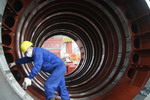Asian stocks fall most in almost 3 years
Updated: 2011-08-08 11:13
By Anna Kitanaka (China Daily)
|
|||||||||||
TOKYO - Asian stocks tumbled the most in almost three years last week, with the regional benchmark index also falling 10 percent from its May peak on concern a global economic recovery is weakening.
Sony Corp, a Japanese consumer-electronics maker that gets more than a third of its revenue from the United States and Europe, sank 6.1 percent in Tokyo even after the Japanese government intervened in the foreign exchange market to stem the yen's gains. BHP Billiton Ltd, the world's biggest miner, plunged 8 percent, leading commodity stocks lower on concern demand will weaken. Hanjin Shipping Co tumbled 17 percent in Seoul.
The MSCI Asia Pacific Index tumbled 7.8 percent to 126.08 last week for its biggest weekly loss since October 2008. The gauge last week dropped more than 10 percent from its May 2 high this year, a decline that some investors define as a correction. Shares fell on four out of the five trading days last week, climbing only on Aug 1 after US President Barack Obama said congressional leaders reached an agreement to raise the nation's debt ceiling and cut the federal deficit.
"It's a panic attack from fear that growth is dropping off a cliff," said Prasad Patkar, who helps manage the equivalent of $1.7 billion at Sydney-based Platypus Asset Management Ltd. "There was an expectation that resolution of the US debt-ceiling issue would trigger a relief rally. It looks like everyone forgot about the weakness in the underlying economy."
Japan's Nikkei 225 Stock Average sank 5.4 percent for the week even as the yen weakened against the dollar after the government stepped in to sell its currency. South Korea's Kospi index tumbled 8.9 percent. Hong Kong's Hang Seng Index slumped 6.7 percent and China's Shanghai Composite Index dropped 2.8 percent.
Australia's S&P/ASX 200 Index plunged 7.2 percent as the Reserve Bank of Australia slashed its 2011 economic growth forecast to 2 percent from its previous estimate of 3.25 percent. The gauge has lost more than 17 percent from its April 11 high this year, nearing the 20 percent level that some investors call a bear market.
The Standard & Poor's 500 Index tumbled 4.8 percent in New York on Aug 4, its biggest decline since February 2009. The measure's slide last week erased its gain for the year, while the Stoxx Europe 600 Index dropped 9.9 percent through the week as concern the global economy is weakening prompted a global rout.
Shares fell even as speculation grew that the US Federal Reserve will start a third round of quantitative easing, or "QE3", after US data in the previous week showed manufacturing grew at the weakest pace in two years, spending unexpectedly fell and service industries grew at the slowest pace since February 2010. The second round of bond purchases ended in June.
"Everyone's rushing for the exit at one time," said Chris Weston, an institutional dealer at IG Markets in Melbourne. "People are saying they're not bothered about returns any more, they just want to make sure their money's safe. There's really no place to hide at the moment. In this kind of market, the investment case for equities is extremely low."
Sony slumped 6.1 percent to 1,828 yen in Tokyo. Toyota Motor Corp, the world's biggest carmaker, lost 3.7 percent to 3,040 yen. Samsung Electronics Co, the South Korean television maker that reports America as its second-largest market for sales, slid 6.5 percent to 789,000 won in Seoul.
Li & Fung Ltd, the biggest supplier of toys and clothes to retailers including Wal-Mart Stores Inc and Target Corp, plunged 7.1 percent to HK$12.04 in Hong Kong. In Sydney, Qantas Airways Ltd, Australia's biggest carrier, sank 8.4 percent to A$1.69. National Australia Bank Ltd. declined 9.3 percent to A$21.77.
Concern the global recovery may be derailed drove investors out of stocks last week and into the relative safety of Treasuries, the Swiss franc and yen.
Bloomberg News













